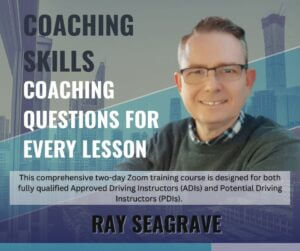
As driving instructors, the art of asking effective questions can be one of the most powerful tools in our teaching arsenal.
Whether you are working with Potential Driving Instructors (PDIs) or fully qualified Approved Driving Instructors (ADIs), understanding and utilising effective questioning techniques can greatly enhance the learning experience for pupils. This article explores the critical role of effective questions in driving instruction, the benefits they bring, and how they can be integrated into your teaching practices to foster better understanding and skill development in pupils.
Promotes Active Learning

One of the primary benefits of asking effective questions is that it promotes active learning. When pupils are encouraged to engage with the material actively rather than passively receiving information, they are more likely to retain and understand the concepts being taught. Active learning involves pupils in the process of their education, prompting them to think critically and independently. This engagement can be facilitated by strategically asking questions that require more than a simple yes or no answer.
Questions that prompt pupils to explain their reasoning, describe their observations, or predict outcomes encourage them to process information deeply. This deep processing is essential for long-term retention and understanding. When pupils are actively involved in their learning, they become more invested in the process and are more likely to take ownership of their progress.
Develops Critical Thinking

Effective questioning also plays a crucial role in developing critical thinking skills. Critical thinking is the ability to analyse information, evaluate different perspectives, and make reasoned decisions. In the context of driving, this skill is vital for making quick, informed decisions that can impact safety. Instructors can help pupils develop this essential skill by asking questions that challenge them to think critically about their actions and decisions.
For instance, questions that ask pupils to consider alternative approaches to a driving scenario or reflect on their actions’ potential consequences can stimulate critical thinking. This process helps pupils understand the rationale behind driving rules and best practices rather than simply memorising them. As a result, they are better equipped to handle unexpected situations on the road and make sound decisions under pressure.
Encourages Self-Reflection

Another important benefit of effective questioning is that it encourages self-reflection. Self-reflection is the process of examining one’s own thoughts, feelings, and actions to gain insight and improve future performance. In driving instruction, self-reflection can help pupils identify their strengths and weaknesses, set goals, and develop strategies for improvement.
When instructors ask pupils to reflect on their driving experiences, they create opportunities for self-assessment and personal growth. This reflection can be facilitated through questions that prompt pupils to consider how they felt about a particular manoeuvre, what they did well, and what they could improve. By regularly engaging in self-reflection, pupils become more aware of their learning process and can better monitor their progress.
Enhances Problem-Solving Skills

Driving is inherently a problem-solving activity. Every time a driver gets behind the wheel, they face a series of decisions requiring quick and effective problem-solving. Instructors can help pupils develop strong problem-solving skills by asking questions that challenge them to think through potential scenarios and come up with solutions.
Effective questions can simulate real-world driving challenges and encourage pupils to think creatively about how to address them. This approach prepares pupils for the practical aspects of driving and builds their confidence in their ability to handle various situations. When pupils are confident in their problem-solving skills, they are likelier to remain calm and composed in challenging driving conditions.
Builds Confidence

Confidence is a crucial component of safe and effective driving. Pupils who lack confidence may struggle to make decisions or take decisive action when necessary, compromising their safety and the safety of others on the road. Effective questioning can help build pupils’ confidence by validating their knowledge and skills and providing them with opportunities to demonstrate their competence.
When pupils successfully answer questions or solve problems posed by their instructor, it reinforces their self-belief and competence. This positive reinforcement can have a lasting impact on their confidence levels, making them more assertive and capable drivers. Additionally, by addressing areas of uncertainty through targeted questions, instructors can help pupils overcome doubts and build a solid foundation of knowledge and skills.
Personalised Learning

Every pupil is unique, with their own strengths, weaknesses, learning styles, and experiences. Effective questioning allows instructors to personalise their teaching approach to meet the individual needs of each pupil. By asking questions tailored to the specific context and challenges a pupil faces, instructors can provide more targeted and relevant guidance.
Personalised questions can help identify gaps in a pupil’s understanding, clarify misconceptions, and address specific concerns. This tailored approach ensures that each pupil receives the support and guidance they need to succeed. Moreover, personalised questioning can make the learning experience more engaging and meaningful for pupils, showing that the instructor is attentive to their individual needs and progress in their driving instruction.
Facilitates Better Communication

Effective communication is at the heart of successful driving instruction. Asking questions is a powerful way to facilitate open and constructive communication between instructors and pupils. When instructors ask questions, they signal to pupils that their thoughts, opinions, and experiences are valued. This can create a more collaborative and supportive learning environment.
Questions can also help clarify expectations, set learning objectives, and provide feedback. Asking pupils to articulate their understanding of a concept or to explain their approach to a task can reveal any misunderstandings that need to be addressed. Similarly, questions that invite pupils to share their feelings or concerns can help instructors provide more empathetic and responsive support.
Encourages Lifelong Learning

The benefits of effective questioning extend beyond the immediate context of driving instruction. By fostering a habit of questioning and critical thinking, instructors can instil a lifelong love of learning in their pupils. This mindset is valuable not only for driving but for all aspects of life.
When pupils learn to ask questions, seek answers, and reflect on their experiences, they become more autonomous and self-directed learners. These skills are essential for continuous improvement and adaptation in a rapidly changing world. By promoting a culture of inquiry and reflection, driving instructors can help pupils develop the tools they need to continue learning and growing long after passing their driving test.
Implementing Effective Questioning Strategies
Integrating effective questioning into your teaching practice requires thoughtful planning and a willingness to adapt your approach based on the needs of your pupils. Here are some strategies to help you make the most of this powerful tool:
- Use a Variety of Question Types: Incorporate different types of questions, including open-ended, reflective, scenario-based, guiding, and challenging questions. This variety can keep pupils engaged and stimulate different aspects of their thinking.
- Encourage Dialogue: Foster an environment where pupils feel comfortable asking questions and expressing their thoughts. Encourage open dialogue and active participation.
- Be Patient and Supportive: Give pupils time to think and respond to questions. Avoid rushing them or providing the answers too quickly. Be supportive and provide constructive feedback.
- Adapt to Individual Needs: Tailor your questions to the specific needs and abilities of each pupil. Consider their learning style, experience level, and any areas where they may need additional support.
- Create Realistic Scenarios: Use questions to create realistic driving scenarios that challenge pupils to think critically and apply their knowledge. This approach can help bridge the gap between theory and practice.
- Reflect on Your Practice: Regularly reflect on your questioning techniques and seek feedback from your pupils. Consider what works well and what could be improved. Continuous improvement in your questioning skills can enhance your effectiveness as an instructor.
Conclusion
Asking effective questions is a fundamental aspect of driving instruction that can significantly enhance pupil learning and development. By promoting active learning, developing critical thinking, encouraging self-reflection, enhancing problem-solving skills, building confidence, personalising learning, facilitating communication, and encouraging lifelong learning, effective questioning can transform the learning experience for pupils.
Instructors who master the art of questioning can provide more engaging, supportive, and impactful instruction, helping pupils become safer, more competent drivers. As you continue to refine your teaching practice, remember the power of a well-placed question and the profound impact it can have on your pupils’ learning journey.
Join My Two-Day Course on Coaching Questions in Lessons

To explore the subject further, I invite you to attend my upcoming two-day course on coaching questions in driving lessons.
This course is designed for both PDIs and ADIs who wish to enhance their teaching skills and improve pupil outcomes. You will learn how to craft powerful questions, integrate them into your lessons, and create a more engaging and effective learning environment for your pupils.
Course Highlights:
- Understanding the principles of effective questioning
- Techniques for different types of coaching questions
- Strategies to boost pupil engagement and learning.
- Plus, a copy of my e-book with over 300 questions you can use in your lessons.
Don’t miss this opportunity to elevate your teaching practice and make a lasting impact on your pupils’ driving skills. Sign up today and take the first step towards becoming a more effective and inspiring driving instructor.
So, are you ready to transform your teaching with the power of effective questions? Secure your spot in my two-day course now and unlock new strategies to enhance your pupils’ learning experience.
Click here to register and start your journey to becoming a master of coaching questions in driving lessons!
